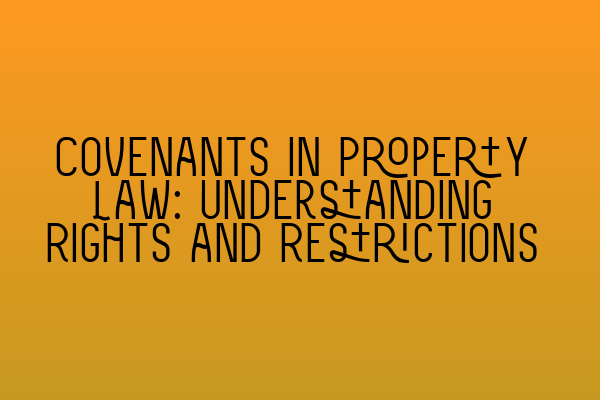Covenants in Property Law: Understanding Rights and Restrictions
In the realm of property law, covenants play a crucial role in defining and regulating the rights and restrictions that are attached to a property. Whether you are buying, selling, or developing a property, understanding covenants is essential to ensure that you are aware of the obligations and limitations that come with it. In this article, we will delve deeper into the concept of covenants, their types, and their implications.
What are Covenants?
Covenants, in property law, refer to legally binding agreements that impose obligations or restrictions on the use and enjoyment of land or property. These agreements are typically entered into by the original developer or landowner and are designed to maintain the integrity and character of a specific area or development.
Types of Covenants
There are two main types of covenants: affirmative covenants and negative covenants.
Affirmative Covenants: These covenants require the party bound by the covenant to perform a specific action or carry out certain responsibilities. For example, a developer may include an affirmative covenant in a property deed to ensure that the homeowner maintains the front yard landscaping.
Negative Covenants: On the other hand, negative covenants restrict or prohibit certain actions or uses of the property. These covenants are often used to maintain a particular aesthetic, protect property values, or preserve natural resources. Examples of negative covenants include restrictions on building height, prohibiting the construction of certain types of buildings, or limiting the use of the property to residential purposes only.
Enforcement of Covenants
Covenants, once properly created, can be enforced by the courts. Typically, the original parties to the covenant or their successors in interest have the right to enforce these agreements. However, it is important to note that the ability to enforce a covenant varies depending on the circumstances and the specific provisions of the covenant.
For example, some covenants may include a “touch and concern” requirement, which means that the covenant must directly relate to the land itself and not be a personal obligation. In such cases, only those parties who have a legal interest in the land, such as subsequent property owners or homeowners’ associations, can enforce the covenant.
Furthermore, covenants may also be subject to time limitations. Some covenants are deemed to “run with the land,” meaning that they are binding on all future owners of the property. Others may have a specified duration or expiration date.
Importance of Professional Advice
Given the complexities involved in property law and the varying interpretations and enforcement of covenants, seeking professional advice is essential. As a solicitor specializing in property law, our team at SQE Property Law & Land Law has extensive experience in handling covenant-related matters. We can assist you in understanding the covenants attached to a property, ensuring compliance, and navigating any disputes that may arise.
Our team of experts can guide you through the process, explaining the implications of covenants, conducting necessary searches and due diligence, and providing sound legal advice tailored to your specific situation.
Conclusion
Covenants in property law serve as important mechanisms for maintaining rights and restrictions on the use and enjoyment of land or property. Understanding the various types of covenants, their enforcement, and their implications is vital for property buyers, sellers, and developers. Seeking professional advice, such as that provided by SQE Property Law & Land Law, is crucial to ensure compliance with covenants and to protect your interests.
For more information on property law, preparation for SQE exams, or to access valuable resources and practice exams, please check out our related articles:
– SQE 1 Practice Exam Questions
– SQE 1 Practice Mocks FLK1 FLK2
– SQE 2 Preparation Courses
– SQE 1 Preparation Courses
– SRA SQE Exam Dates
We at SQE Property Law & Land Law are committed to providing comprehensive legal services and resources to support you in your property-related endeavors. Contact us today for assistance or further information.
